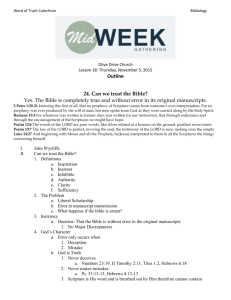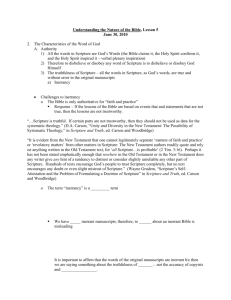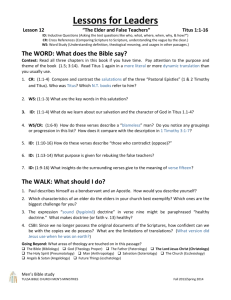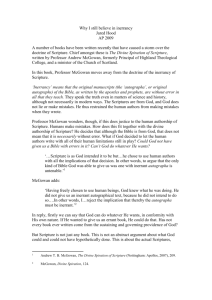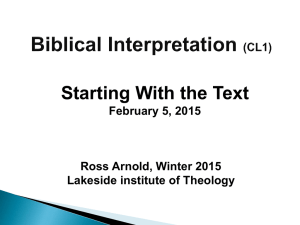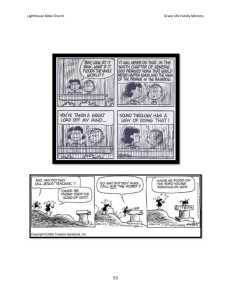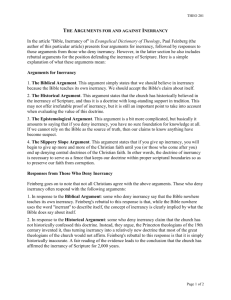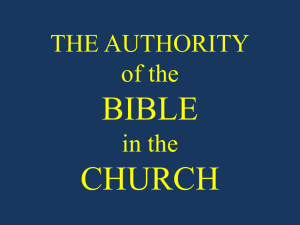Inerrancy - Ann Arbor Christian Reformed Church
advertisement
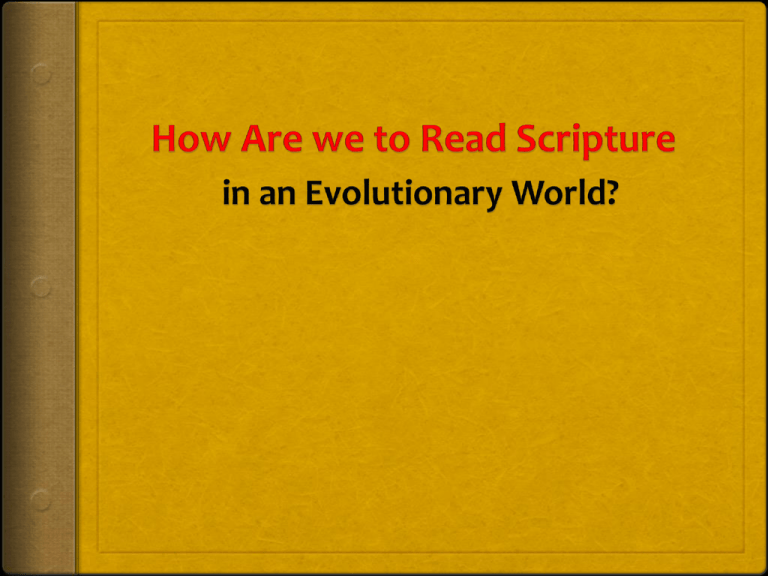
If you had been there with a camera could you have taken a picture of the snake talking to Eve? Did the sun stand still and the moon stop until the nation avenged itself on its enemies? (Joshua 10:13) Is it literally true that “the world is firmly established; it cannot be moved? (Psalm 93:1) If “Joshua took the entire land…and the land had rest from war,” (Joshua 11:23) why do we read in Judges that, after Joshua’s death, Israel had a lot of fighting still to do? According to Matthew, Mark and Luke, Jesus cleansed the Temple during the week of his crucifixion. According to John, he did it at the beginning of his public ministry. Did Jesus cleanse the Temple twice? When did he really do it? Evolution and Biblical Inerrancy 1. John Schneider –Calvin College “In the last century, theologians of major Christian denominations (Eastern Orthodox, Roman Catholicism, and mainline Protestantism) have managed to find ways of formulating Christian theology to make it compatible with the theories of modern evolutionary science. However, scholars in conservative Protestant churches are still unsure how they could affirm the Grand Evolutionary Hypothesis (A. Plantinga) without compromising the biblical and confessional core of their distinct traditions. In this article, I choose to focus on the most fundamental source of difficulty, namely, that evolutionary science seems to be in conflict with the doctrine (of) the historical Fall. (This will entail abandoning) belief in the verbal inerrancy of scripture….” Does the CRC speak of biblical inerrancy? What is meant by it? Inerrancy CRC statements: 1972 Statement on Biblical Authority (Report 44) In both creation and Scripture God addresses us with full authority. … As Reformed Christians we must take both revelations seriously. Taking Scripture seriously leads to recognizing science as a legitimate expression of the cultural mandate. Therefore we must seek to profit from and make thankful use of the findings of science as seen in the light of Scripture. Motivated by these convictions we often discover that the results of scientific investigation become the occasion for reviewing and sometimes, upon further biblical reflection, even revising certain standing interpretations of the Bible. The church may not, however, allow its message to be made dependent upon the scientific enterprise, nor allow scientific findings to dictate its interpretation of the Bible…nor allow any science, including theology, to determine what is believable and what is not believable in the Bible. CRC Synod 1983: Report on Our World Belongs to God: a Contemporary Testimony In answer to modern criticism of the Bible the evangelical Christian community has vigorously defended the historic doctrines of the inspiration, authority, and infallibility of the Bible. As evangelicals engage in this defense, they themselves have been divided over the insistence that inerrancy would be a firmer test of faith. The basic thrust of the term inerrancy has been acceptable to the CRC…. When both terms are understood as a confession of the full trustworthiness and reliability of Scripture, that it is without error in its disclosure of the history of redemption, inerrancy and infallibility are nearly equivalent terms. But some consider inerrancy to be the stronger affirmation. They then look for a precision and accuracy in biblical revelation which meets the standards of modern historiography. Weaknesses in this view are that preconceived notions of inerrancy may be imposed on the Bible…. For us, as for the Reformers, Scripture is necessary for knowing the truth, it is sufficient for salvation, it is clear in its witness to Jesus Christ, and it is authoritative for living the Christian life. 32. The Bible is the Word of God, the record and tool of his redeeming work. It is the Word of truth, breath of God, fully reliable in leading us to know God and to walk with Jesus Christ in new life. CRC current website: What we Believe: The Bible We believe that the Bible is the authoritative Word of God. It contains all that people in any age need to know for their salvation. We call the Bible God’s Word, believing that, by the power of the Holy Spirit, God speaks to us through this book. Chicago Council for Biblical Inerrancy (1978), adopted by Evangelical Theological Society (2006): a. A Short Statement: (1 of 5) Being wholly and verbally God-given, Scripture is without error or fault in all its teaching, no less in what it states about God's acts in creation, about the events of world history, and about its own literary origins under God, than in its witness to God's saving grace in individual lives. b. Articles of Affirmation and Denial XII (0f 19) We affirm that Scripture in its entirety is inerrant, being free from all falsehood, fraud, or deceit. We deny that Biblical infallibility and inerrancy are limited to spiritual, religious, or redemptive themes, exclusive of assertions in the fields of history and science. We further deny that scientific hypotheses about earth history may properly be used to overturn the teaching of Scripture on creation and the flood. [Thom Stark: The Human Faces of God: What Scripture Reveals When It Gets God Wrong (and Why Inerrancy Tries To Hide It?)] Guidelines for Interpreting Scripture 1. Pray for the Holy Spirit: “The same Spirit who has spoken through the mouths of the prophets must penetrate into our hearts to persuade us that they faithfully proclaimed what had been divinely commanded.” Calvin, Inst. 1.VII.4 2. What kind of language is being used? Figurative? Sarcasm? Literal? 3. What is the literary genre of the text? Poetry? Letter? Narrative history? Fictional history? Biography? Wisdom proverb? 4. Who is the expected audience? Jews? Gentiles? God? 5. What is the purpose of the text? Encouragement? Rebuke? Worship? Apologetic? Teaching? Proclamation? 6. What relevant extra-textual knowledge is there Contemporary texts, archeology, science 7. Progressive revelation: What is God like? Image of God, resurrection, God’s presence, etc. 8. Accomodation: God speaks of things “according to our capacity for understanding them, not according to what they are.” (Calvin) “The communication of God’s word to its first rude audience, for Calvin, explained many otherwise puzzling biblical texts, especially those which seemed to deal with natural phenomena in unscientific ways. Such passages should be interpreted figuratively, figures being, Calvin thought, appropriate to the earliest stages of human culture… (Bousma, John Calvin, 124) Phenomenological language The world is described as it appears: The world is firmly established; it cannot be moved. Your throne was established long ago; you are from all eternity.” (Ps 93:1,2; cf. 96:10; 1 Chron. 16:30) What did this mean for its original audience? They would have heard the author using the common belief that the earth is solid and stable to state the theological truth that God’s reign is solid and stable. Phenomenological language Three-tiered universe: The heavenly realm, the earthly world, the underworld. Cf. Phil 2 Diseases often explained as caused by evil spirits: "My son is possessed by a spirit that has robbed him of speech. Whenever it seizes him it throws him to the ground. He foams at the mouth, gnashes his teeth and becomes rigid. Jesus rebuked the spirit: You deaf and mute spirit, I command you to come out of him and never enter him again. –Mk. 9:17-25 Incarnational Approach An incarnational model of (scriptural interpretation) is one that expects Scripture to have an unapologetically thorough human dimension analogous to Jesus’ complete humanity. An incarnational model presumes a book like Genesis to express itself in ancient conventions. And such an ancient, contextual expression is not an embarrassment but an indication of how willing God is to meet us where we are…. —Peter Enns Are there conflicts/tensions in the Bible? If a particular interpretation of a passage leads to a conclusion that is contrary to other parts of Scripture, that’s an indication that the interpretation may be incorrect. —Haarsma Ethnic or universalistic emphasis (Gen 12, Ezra, Ephesians, Paul vs. Peter) Universal salvation/particular salvation Righteous vs. wicked in Psalms, Job, Jesus John & Hebrews? (Scott McKnight) Is Scripture Sometimes Wrong? Scientifically? The Bible makes statements about the physical world that are false. The mustard seed is not the smallest of all seeds. The earth is not stationary…. –Denis Lamoureux Theologically? Genesis 1-11 makes statements about the activities of God and humans that are false. The Creator never made the universe and life in six days, he did not destroy the entire world with a flood…. –D. Lam. These ancient historical paradigms are incidental vessels employed by the Holy Spirit to deliver Messages of Faith. The attribution of divine (creative and judgmental) and human (sinful and righteous) acts in Gen 1-11 are cast in ancient motifs which were inherited by the Hebrews. —D. Lamoureux Human Origins Seminar Series at Calvin College http://www.calvin.edu/~lhaarsma/HumanOrigins SeminarPage.html
